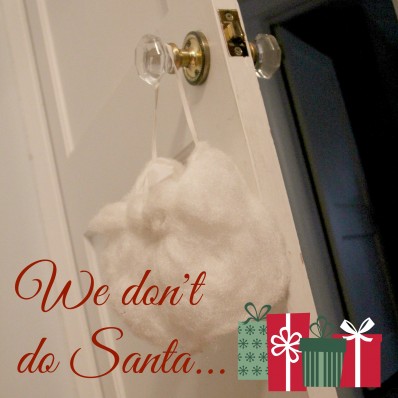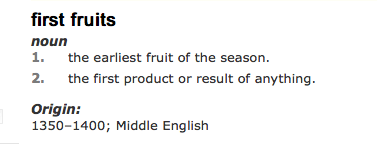It started already–the Santa talk. I was out yesterday shopping with all four, and Lydia was convinced she needed this kit to paint a dinosaur. As I kept my cool and she was losing hers, a very sweet lady offered some help: “Oh, no, no, no. Why don’t you ask Santa for it?” which actually helped tremendously and not because it was a good option. Lydia quieted, stopped, and looked at me with eyes that were saying, “what up with the 60 year old lady telling me to ask a pretend person for this $2 craft kit?” I responded saying, “Lydia, it would make a nice Christmas gift. Who brings you gifts on Christmas?” “Ummm…Mama and Daddy?” I then very kindly turned to the woman and said, “We don’t actually do Santa in our family” to which she quieted, stopped, and looked at me with eyes that were saying, “What up with this 30 year old lady with a heart of stone?” (I was generous with the number 60, so why not be generous with my number, alright?)
So, yeah, we don’t do Santa in our house. (go ahead, get your gasps out now.)
 The kids know that we shop for gifts for them, and we fill their stockings hung by the chimney with care. We tell the kids that some families like to play a game with their children, pretending that Santa is real and brings them gifts at Christmas. But, he’s just that, a game based on a really nice man who lived a long time ago named St. Nicholas who gave money to poor families.
The kids know that we shop for gifts for them, and we fill their stockings hung by the chimney with care. We tell the kids that some families like to play a game with their children, pretending that Santa is real and brings them gifts at Christmas. But, he’s just that, a game based on a really nice man who lived a long time ago named St. Nicholas who gave money to poor families.
We’re cool with him though. We still wave to him at the mall as we explain that it’s really a man dressed up like Santa. In fact, we’ve got one of those real-deal costumes ourselves in our cedar closet that my granddad used to wear. We’ve even got a mini version that Drew wears year round. We still read Twas the Night Before Christmas and sing along to Here Comes Santa Claus. But, we’ve just never been into the whole game for a handful of reasons.
* Keeping up the Santa story can distract us from talking about Jesus’ birth and the significance of the incarnation. Talking about the history of Santa is a great tool to talk about giving and compassion. Some families certainly do that really well. When we do talk with our kids about families who do the Santa thing, that’s what we focus on, never giving the impression that those families are somehow inferior or not as spiritual or something crazy like that. But, as our children get older, my desire for them to really understand the most significant demonstration of giving and compassion has grown. For me, playing the Santa game can mean more conversations about presents and traditions and less about who God is and the most amazing gift ever known.
* I know it can be fun, but it’s not truth. In fact, we know people who have created quite a Pinnochio-style web of lies to protect their children’s belief in Santa. As their children have started connecting the dots, the stories the parents have come up with to keep it all have gotten a wee bit silly. Perhaps it’s my overthinking coming into play, but we’d rather have our kids know they can totally trust us rather than build a complicated story that others reinforce which they later find out isn’t actually true. If we lie about Santa being real, would our children question whether we are lying about other things that are unseen? If we ask them to believe in a Santa they cannot see and they find out we have lied, will they doubt whether our testimony that God is real is true?
* We want our children to understand the value of the gifts they are given, from us or other family members, and recognize that some gifts are a real sacrifice financially and have taken a lot of effort. We want them to learn gratefulness for this sacrifice. While I know Santa can be used as a picture of generosity, telling our children that Santa gave them their gifts instead of the family member who lost his job that year but still figured out how to give them a gift or the cousin who is young and used her allowance to buy just the right little thing takes away from their understanding of generosity and sacrifice.
* We do not want them to fall prey to a works mentality. We’ve all heard it–“Stop that or else Santa will put you on the naughty list!” We don’t want our children to think that blessings depend solely on whether they have been good or bad. We want them to understand what grace is–God’s unmerited favor, kindness from God that we don’t deserve. There is nothing we have done or can ever do to earn this favor. The classic lesson that “being bad” may put them on the “naughty list,” translating into less presents or a lump of coal could really hinder their understanding of grace.
It’s how we do things here. But, we respect that others do things differently–especially those who have overthought it all as I have and have come to a different conclusion. Some families really know how to do Santa well and still teach generosity, compassion, and grace as they do it. And, I know friends who have fond memories of leaving out milk and cookies and all that and want to give their kiddos the same. I get that. We’ve got some traditions we can’t let go of too. And, don’t worry–we tell the kids that some families really like the game. They have strict instructions not to tell other kids that Santa isn’t real in case their families are playing the game.
